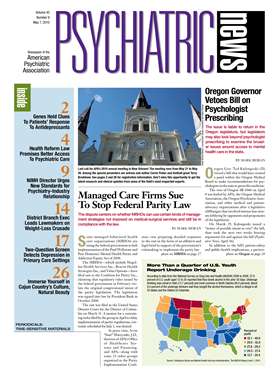Numerous mutations, some of which were found in unexpected places in the genome, have been linked to therapeutic response to antidepressants among patients with depression, a new genomic study reported.
Research in this area hopes to explain individual variations in patient response to different antidepressant drugs and one day help clinicians tailor the most effective treatment to each patient.
This study, published online in AJP in Advance on April 1, was part of the larger Genome-Based Therapeutic Drugs for Depression (GENDEP) project, a multinational collaboration by researchers in the United Kingdom, Poland, Croatia, Germany, Denmark, Italy, Belgium, Slovenia, Canada, and France.
More than 800 adult patients with a diagnosis of moderate to severe unipolar depression participated in the intervention part of the study, and 706 of the patients provided DNA samples for analysis. All participants were of white European ancestry.
Most of the participants were randomly assigned to receive either escitalopram or nortriptyline for 12 weeks on an open-label basis. A minority of patients who had contraindications to one of these antidepressants were assigned to the other drug.
The two drugs were chosen for their different mechanisms of action: Escitalopram is highly selective for inhibiting the serotonin reuptake receptor with no binding to the norepinephrine reuptake receptor, while nortriptyline is a strong inhibitor of norepinephrine reuptake with very weak binding to the serotonin reuptake receptor. Among the patients who were included in the study, 394 received escitalopram and 312 received nortriptyline.
To find genetic variations that may significantly influence patients' response to either antidepressant, the researchers tried two approaches to uncover ties between genetic variations and antidepressant response. In the first approach, they scanned the entire genome using more than half a million single nucleotide polymorphism (SNP) markers to pick up any signs of association. In the second approach, they focused on variants in 72 candidate genes and the DNA regions around these genes.
The clinical response to either antidepressant was measured by the change in Montgomery-Asberg Depression Rating Scale (MADRS) scores from baseline to the end of treatment.
In the genomewide analysis, polymorphisms in the gene encoding for uronyl 2-sulphotransferase were significantly associated with patients' response to nortriptyline. This association was the strongest in the entire study. Uronyl 2-sulphotransferase is an enzyme involved in neurogenesis and the migration of neurons. The observation that the gene for this enzyme is associated with response to nortriptyline appears to corroborate the neurogenesis theory of antidepressant effects, the researchers pointed out.
They also identified SNPs concentrated in two intergenic regions on chromosomes 1 and 10 as potentially associated with response to antidepressants. Intergenic regions are stretches of DNA that neither code for any genes nor regulate the expression of close-by genes. However, when DNA strands are folded, they may have a spatial or structural influence on the expression of certain genes that are linearly far away. These regions had not been associated with a clinical response to antidepressants in past research, and a possible mechanism for this connection is unknown.
In addition, variants in the gene encoding for interleukin-11 (IL-11), a cytokine, were linked to response to escitalopram.
The targeted analysis of 72 preselected candidate genes did not generate any strong association with antidepressant response. However, a potential but weak link was identified between response to escitalopram and the gene coding for interleukin-6, which is closely related to the gene for IL-11. This and the significant association with the IL-11 gene support the theory that inflammatory cytokines play a role in the therapeutic effect of antidepressants. Both cytokines are extensively expressed in the brain and have been shown to play a role in serotonin signaling.
The authors noted that because the study sample was not large enough to provide sufficient statistical power, genes with moderate effects on the clinical response were likely to be missed by the analysis.
The GENDEP project was supported primarily by a European Commission grant. GlaxoSmithKline and several U.K. organizations provided additional funding. Lundbeck, a Danish drug company, donated both study drugs.
